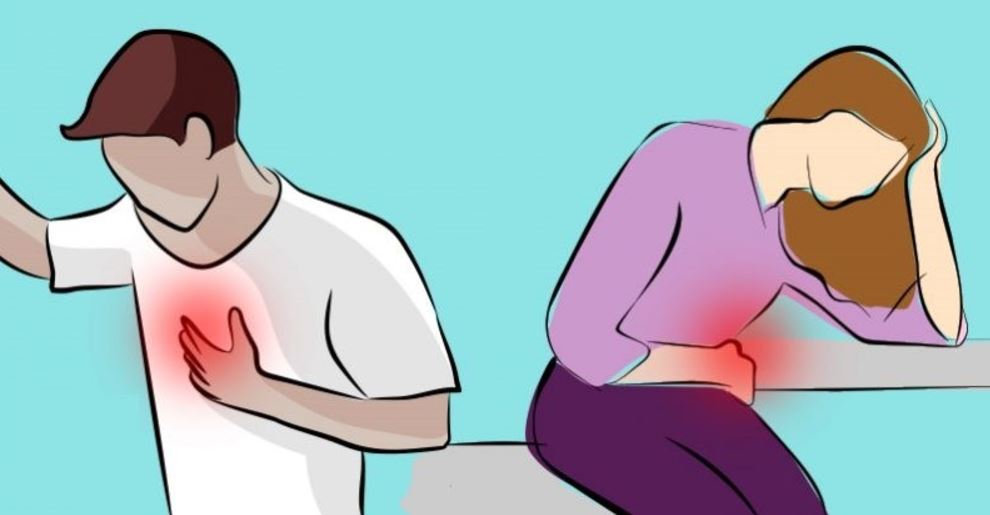

Gastroesophageal reflux disease (GERD), commonly known as acid reflux, is a way of describing heartburn medically. It is very common problem, currently affecting 50 percent of Americans.
Heard Of GERD?
Heartburn is a sign that you have eaten something that your stomach cannot handle. GERD is when the acid contents of the stomach or the pancreatic liquids themselves ho back into the esophagus, which causes discomfort.
This seemingly harmless acid causes irritation, inflammation, and scarring, which may narrow the esophagus and lead to symptoms lie nausea, coughing, wheezing, burning of the throat, hoarseness, food getting stuck in the throat, eroded tooth enamel, and asthma-like symptoms.
It is worth noting that GERD increases the risk of esophageal cancer, although not drastically. If it goes on for an extended period, you are likely to develop Barrett’s Esophagus, a disorder in which gland cells replace squamous cells in the stomach, eventually leading to dysplasia and cancer.
What’s Triggering Your GERD?
Determining the cause of your acid reflux is the first step. If you are older or overweight, the chances are your abdominal fat is interfering with esophagus function. Some of the most common aggravators of GERD symptoms include:
- Caffeine
- Nicotine
- Alcohol
- Fatty, greasy, or spicy foods
- Chocolate
Here are some of the best GERD relievers which should be tried out in the place of store-bought antacids:
1. Lose Weight
It has been scientifically shown that losing 8-10% of your weight significantly reduces acid reflux symptoms.
2. Change Your Diet
“Don’t get too excited; it only makes a difference for about 30 percent of people,” says Patricia Raymond, a gastroenterologist in Chesapeake, VA. “Plus, the problem with the diet is that we find most people would rather die than be on that diet for the rest of their life.” The first step includes eliminating the common offenders like spicy foods, chocolate, and alcohol and removing all processed and fast food from your diet.
3. Room temperature water and lemon
According to Rebekah Fedrowitz, an applied holistic nutritionist, “By drinking this on an empty stomach 15 to 20 minutes before eating anything else, the body can naturally balance out its acid levels.” Cold water is not recommended as it stresses the stomach and the intestines. On the other hand, warm water is better accepted by the esophagus and the stomach.
4. A tablespoon of baking soda in a half cup water
While this solution is not tasty at all, it does work wonders for acid reflux.
5. Apple cider vinegar
Apple cider vinegar is extremely versatile and it really works as an amazing cure-all. As explained by Christina K. Major, holistic nutritionist and naturopathic doctor in Trevorton, PA, “Many people mistakenly believe all acid reflux and indigestion is caused by an overproduction of acid. The latest research shows it’s actually the opposite for many people: There is too little acid produced to adequately digest the food eaten.”
6. Supplement with Saccharomyces boulardii
This probiotic strain for the small intestine helps maximize absorption of key vitamins for optimal digestive health.
7. Slippery elm
This herbal supplement is available in powder, capsule, and lozenge form. It is very effective in soothing the irritated tissues of the digestive tract.
8. Tea time
Fenugreek and chamomile tea are some of the most effective in reducing acid reflux symptoms. Peppermint tea is yet another good idea, as it helps with an upset or full stomach.
9. Chewing gum
Chewing gum increases saliva production, which in turn lowers acid levels in the esophagus.
10. Sleep on your left side
It has been scientifically shown that sleeping on the right side or on the stomach causes pressure on the intestines and increases acid reflux symptoms.
Sources:
http://www.mayoclinic.org/diseases-conditions/gerd/basics/definition/con-20025201
http://www.mnn.com/health/fitness-well-being/stories/13-surprising-home-remedies-for-acid-reflux
http://www.nature.com/ajg/journal/v94/n8/abs/ajg1999503a.html